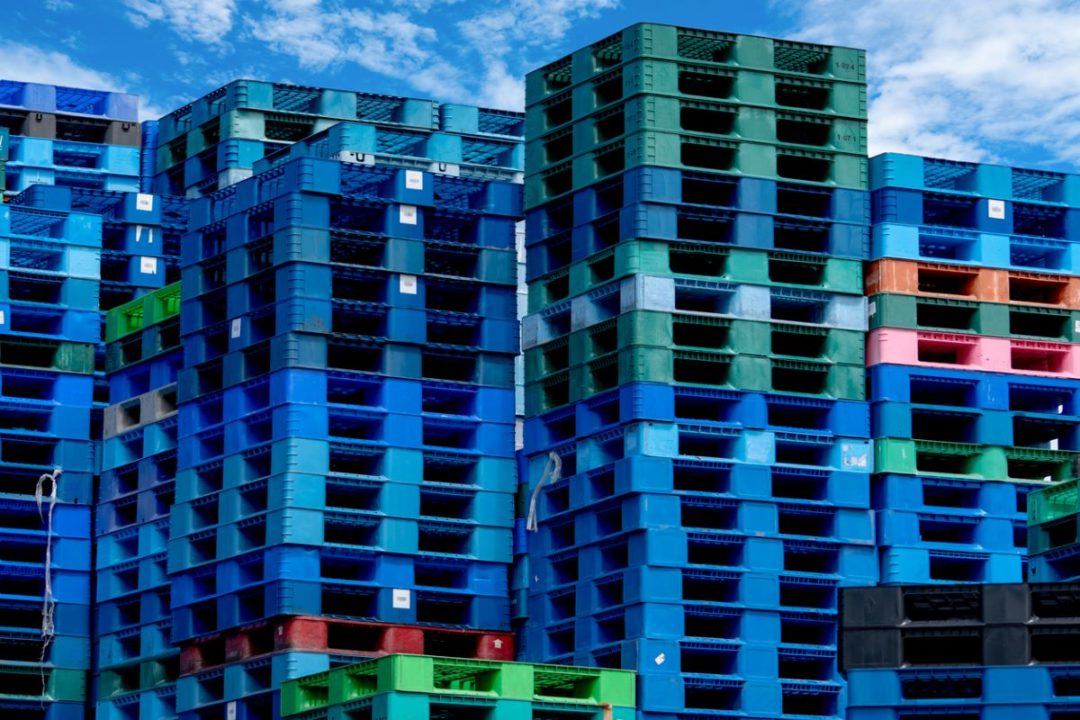
It’s no secret that plastic plays a major role in industries all over the world. It’s easy to see why, too. Plastic is incredibly versatile, affordable, and durable. However, plastic is also non-biodegradable, polluting when in landfills, and difficult to produce in a clean way. This raises a crucial question: Is plastic a friend or a foe in the world of supply chains?
For many businesses, saying that plastic is a “friend” would send a chill down their spine, but this stigma is one that needs to be dispelled in order to make plastic effective, and progress it towards being a more sustainable material.
Plastic Pallets vs. Wooden Pallets: Navigating the Debate
A major use for plastics in supply chains and logistics is plastic pallets. Like all plastic debates, the argument about the environmental impact of plastic pallets compared to wooden pallets is complex. Considerations such as production, usage, and end-of-life disposal are all relevant and important factors to bear in mind. But that’s not to say that plastic pallets should be done away with. In fact, plastic pallets offer many advantages in terms of durability, moisture resistance, and reusability. Additionally, their longer lifespan also reduces the frequency of replacements, and their resistance to moisture prevents mould growth. With this in mind, plastic pallets are clearly a very functional choice.
Wooden pallets also come with great advantages, but as they are made from a fully recyclable material, they are inherently more environmentally friendly. Not only are they biodegradable, but they can also be easily recycled or repurposed. Wooden pallets often have a shorter lifespan than their plastic counterparts though, which can lead to more frequent replacements. Additionally, wood is susceptible to moisture, potentially resulting in rot or mould growth. Despite this, wood pallets are still a very effective choice for shipping purposes.
While plastic pallets lose out on being as environmentally friendly as wooden pallets, they are still recyclable, and businesses need to have end-of-life procedures in place to ensure that all plastic pallets are disposed of properly.
Spain's Regulatory Stance: A Case Study in Plastic Monitoring
Spain has taken a pioneering role in monitoring and controlling the use of plastic. Shipments to Spain now require a detailed document which is signed by the exporter to provide a comprehensive overview of the plastics being imported.
This document goes beyond a simple formality; it specifies whether the plastics are recycled, the net weight of each type, and adherence to specific criteria related to their use and destination.
While not all carriers have adopted such stringent measures, Spain's approach highlights a growing global consciousness regarding responsible plastic usage in logistics.
Advocating Responsibility in Plastic Usage
It is essential for businesses to advocate for, and demonstrate, responsible plastic usage within the logistics landscape. Emphasizing the importance of using plastic materials responsibly, and encouraging customers to opt for reusable options is key to the progressive utilization of plastic, and to ensure best practices.
Businesses don’t have to be "pro" plastic but should adopt a conscientious approach. It's about recognising the utility and function of plastic while simultaneously being committed to mitigating its environmental footprint.
Navigating Complexity in the Plastic Debate
Navigating the use of plastic in logistics requires striking a delicate balance. It's essential to harness the utility of plastic while addressing its potential drawbacks. Industry stakeholders bear the responsibility of exploring and adopting sustainable alternatives. This may include opting for materials with a lower environmental impact, or developing efficient processes for plastic recycling.
Ultimately, while no size fits all, plastic is a material that is incredibly functional when used properly. The most important aspect is to treat plastic with consideration when it is no longer fit for purpose.
The Path Forward: A Sustainable Vision for Logistics
As the logistics industry continues to evolve, sustainability remains at the forefront of ongoing initiatives. One thing all businesses should share is the commitment to creating a logistics landscape that is both efficient and environmentally conscious. The industry vision should extend beyond the immediate transaction, to the broader impact of operations on the planet.
The role of plastic in logistics cannot be boiled down to the binary view of "friend or foe." Instead, plastic should be seen as a dynamic material that requires continuous evaluation and improvement. It is through the commitment to responsible usage, recycling initiatives, and proactive exploration of sustainable alternatives that supply chains can navigate the complexities of plastic in logistics and pave the way for a more sustainable future.
George Wicks-Farr, Customer Service Supervisor at Pallet2Ship







